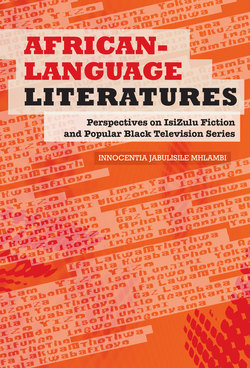Читать книгу African-Language Literatures - Innocentia Jabulisile Mhlambi - Страница 18
На сайте Литреса книга снята с продажи.
Proverbs and the boundaries of the family
ОглавлениеThe narrative’s exploration of the nature of relationships reveals the author’s preferred reading of the traditional knowledge around the family. By exploiting ideas about what constitutes an ideal family, Radebe has not only reconciled Nomvula and Makhaya but has also been able to discount contemporary views that families can be constituted by adults who are not the biological parents of children. This is illustrated through the impending marriage between Nomvula and Sipho. Their relationship is subjected to a series of tests through which it emerges that Sipho has always despised Nomvula’s son. Consequently Nomvula is left with no option but to terminate her engagement. The proverbs used to describe Sipho’s actions and personality illuminate his position as an intruder into Makhaya’s family unit and, significantly, show how unnatural his role as a father will be. Sipho is said to have ‘bhodlela emswaneni’ (a belated grumbling) (Radebe: 22) when hearing about the abduction and how Nomvula has gone after Makhaya to beg for the return of her child. However, even though he grumbled he saw in Makhaya’s act a solution for getting rid of Nomvula’s child. He had intended to send Sibusiso to a distant boarding school after the wedding but Makhaya’s actions create an opportunity and prompt him to negotiate for the child to be handed to his father through a legal process. Sipho’s actions point to the axiom that a man cannot raise another man’s child, a concern that led Makhaya to abduct his son from Nomvula.
Nomvula’s entrapment between Sipho, who she has realised harbours a deep-seated hatred for her child, and Makhaya’s chauvinistic demands, makes her desire to escape. When the three of them are supposed to discuss the status of the child she disappears and the proverb ‘usele nesisila sehobe’ (he was left behind holding a feather of a wild dove) (Radebe: 79, 82) is cited. This saying predicts that Sipho will be jilted in favour of the biological father of the child. This proverb also describes Sipho’s destitution after he has been deserted by the woman he loves; he feels as though Nomvula has dumped him like ‘inyongo yenyathi’ (the gall bladder of a deer). Thus axioms deduced from these proverbs foreground Sipho’s deceptiveness, warn against raising another man’s child while that father remains alive and emphasise the sanctity of the family. Makhaya’s re-appearance in Nomvuyo’s life helps her to see Sipho for who he really is. Sipho is found to be morally repulsive as she is drawn back to Makhaya. The union between herself and Makhaya occurs despite Nomvula’s earlier protestations of ‘lingawa licoshwe zinkukhu’ (it [the sun] will fall and be eaten by the chickens) (Radebe: 28) meaning she will never be involved with Makhaya again. However, this union has been predicted through numerous proverbs strategically located in the narrative.
In the application of the above proverb as associated with Nomvula, there is an implied understanding that the father acted within his rights to take the child because Nomvula’s family had warned her that getting the child back might not be as easy as she thinks, saying ‘uyodela uMakhasana7 oyozibona zingqubuzana’ (It is well with Makhasana who will see them fight) (Radebe: 19). The truth of the proverb works in tandem with the pressure that her family exerts on her that questions her decisions about single parenting. These decisions are made to appear thoughtless and egocentric. This causes her to lose confidence in her convictions and to see the need for dual parenting (Radebe: 10, 53). Equally, the events of the narrative are structured in such a way that all her attempts to get her child back fail and the proverb ‘ufe olwembiza’ (breaking up to little pieces like a clay pot) (Radebe: 80) describes her state of ‘speechlessness’ after all her attempts have failed.
Regarding Thembisile’s involvement with Makhaya, there is a proverb in the text that indicates that Makhaya will be compelled to choose between Thembisile and Nomvula. When the narrator says, ‘akukho zinkunzi zimbili zakhonya sibayeni sinye’ (two bulls will never stay in the same kraal) (Radebe: 96) this introduces the author’s perspective on the sanctity of family. Even though the proverb creates suspense, it is anticipated that Makhaya will opt for Nomvula since it has been prefigured in the use of the proverb ‘ubucwibi obuhle ngobuhamba ngabubili’ as discussed earlier on.
A number of other structural devices have been employed by the author to channel the interpretation of the narrative. These are the dream artifice, ancestral intervention and nature as reflected in the ecosystem. The dream artifice has been structured in such a way that in all three instances Nomvula is saved by Makhaya (Radebe: 36, 64), prefiguring their reunion at the end of the narrative. In the second technique, the author has drawn on the traditional belief system, in which the ancestors are supposed to intervene in human destinies (Radebe: 52). The last strategy makes use of natural phenomena. For example, the author dramatises the capture of a frog by a snake (Radebe: 92). This occurs in a scene where Nomvula has failed for the third time to take her son back from Makhaya. Conveniently, it occurs at Makhaya’s place in the Eastern Cape, where the belief in inkwankwa (a snake believed to be representative of the ancestors) takes precedence in matters relating to the ancestral acknowledgement of children. Both on the literal and symbolic levels, the natural relationship between the prey and the predator is unavoidable. Thus there is a reading of the narrative in which the matrimonial bond between Nomvula and Makhaya is an inevitable occurrence in which Nomvula’s individuality will be swallowed by the greater demands of social expectations.
